12 Best Beginner Trading Apps
Discover the 12 best beginner trading apps with easy-to-use features and tools to help new investors start trading with confidence.

When you're starting your trading journey, figuring out where to learn trading and which tools to use can be overwhelming. The right beginner trading app can make all the difference, offering a user-friendly interface, educational resources, and the features you need to maximize your trading potential. This guide will help you choose the best beginner trading app, aligning with your goals.
Aqua Funded's funded trading program can further accelerate your progress by providing the resources and support you need to maximize your capital.
Is Trading Easy for Beginners

Trading Demands a Diverse Skill Set
To thrive in trading, you need more than just spotting opportunities. It’s about maintaining discipline, acquiring knowledge, gaining experience, and developing mental strength. Sticking to your plan, especially under pressure, is tough for newcomers. You're up against pros with advanced tech, financial resources, and years of experience. This puts beginners at a clear disadvantage.
The High Stakes of Leverage and Day Trading
Day trading is risky, fast-paced, and often driven by short-term volatility. Many newcomers lose money because they underestimate how quickly markets can move. Leverage increases potential gains but also potential losses. Without solid risk controls, even minor mistakes can have serious consequences.
Most Beginners Struggle to Make a Profit
Research shows a high failure rate among day traders. Studies indicate that only about 10% of these ventures are profitable, meaning 90% lose money. Beginners are often tempted by oversimplified "get rich quick" schemes and misleading advice.
The Overwhelm of Trading Options
Trading offers a variety of assets, including stocks, ETFs, options, commodities, forex, and cryptocurrencies—each with its own unique dynamics. New traders often find this variety confusing. Choosing a strategy that suits your temperament, like swing trading versus day trading, and knowing when to enter or exit a trade can be challenging.
Education and Realistic Expectations Matter
A seasoned day trader advises consistent learning, starting with no expectations, avoiding hype, and improving gradually. Structured education is key. Expert-guided courses and certifications can help create a strong foundation. This is especially true in forex, where managing risk with stop-losses, trade plans, and disciplined systems is crucial.
Crypto Trading: Simple But Still Risky
Setting up a crypto trading account is easy. Platforms like Coinbase and Kraken are user-friendly for beginners. However, high volatility, potential scams, and decisions driven by hype can catch inexperienced traders off guard.
Voices from the Real World
Reddit traders speak candidly about the challenges: “Trading is unpredictable, and it’s not something that can be handed to you. You must find and define a strategy that works for you.” Others also acknowledge the steep learning curve new traders face.
11 Tips for Learning Trading for Beginners
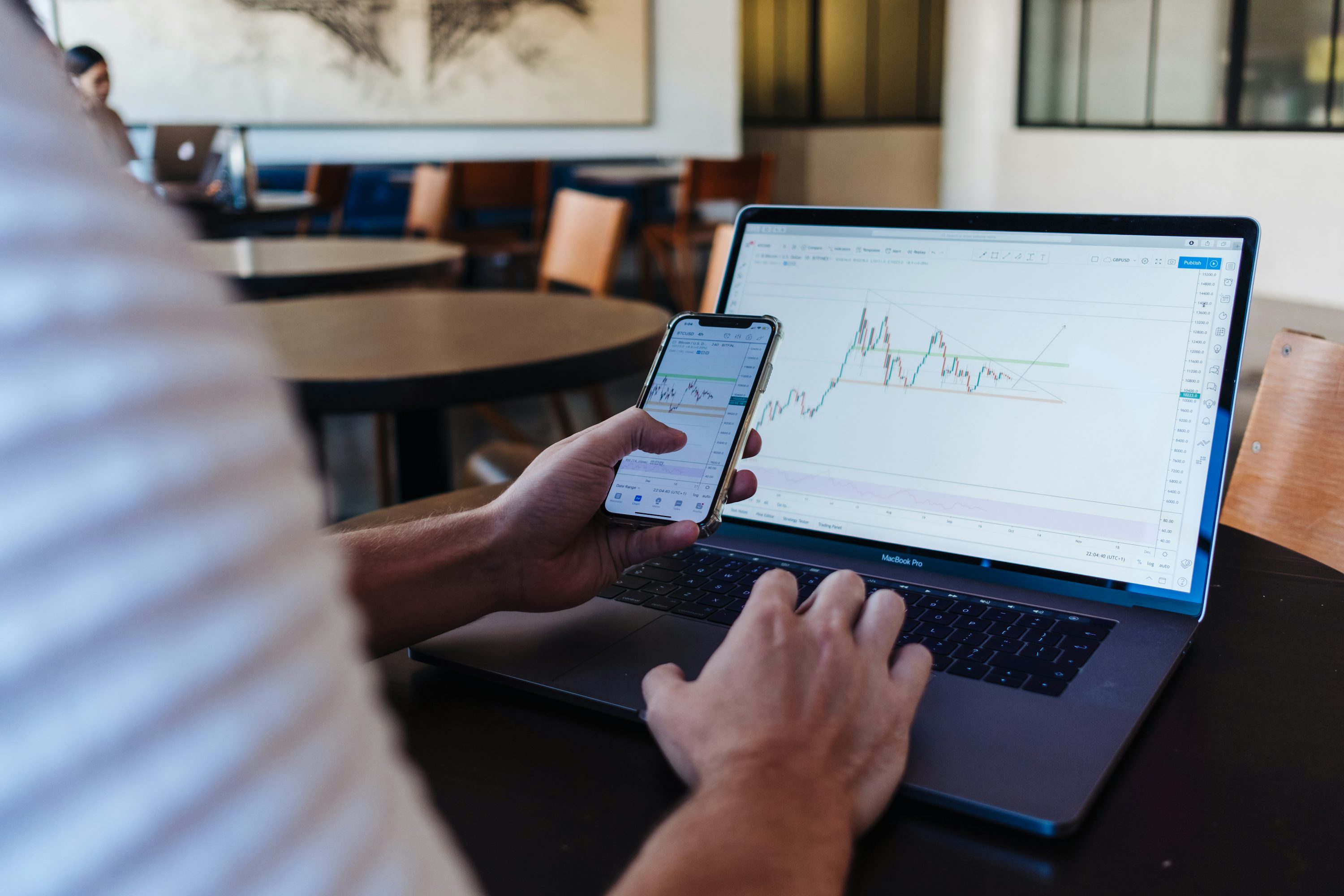
1. Dive into Funded Trading with AquaFunded
Start your trading journey with a funded trading program like AquaFunded. This approach allows you to leverage accounts of up to $ 400,000 without risking your own money. AquaFunded offers hassle-free trading conditions, including no time limits and flexible profit targets. Join over 42,000 traders worldwide who've already collected more than $2.9 million in rewards.
2. Grasp the Basics
Begin by building a solid understanding of how trading works. Familiarize yourself with the core elements of financial markets, asset classes, and trading strategies. It’s essential to decode industry jargon, and you can find a comprehensive glossary on various websites to help you out.
3. Pick Your Market Wisely
Different markets have unique characteristics that require distinct trading strategies. Choose a market that aligns with your interests, resources, and risk tolerance. Whether it’s stocks, forex, or commodities, ensure it fits your trading style.
4. Select a Trading Strategy
Every strategy demands a different level of knowledge and commitment. Evaluate what best suits your financial goals. Whether you aim for short-term gains or long-term investments, pick a strategy that aligns with your objectives.
5. Open a Trading Account
Choosing where to open a trading account can be daunting due to the numerous options available. Choose a reputable brokerage that provides a platform equipped with the necessary tools for success. Prioritize reliability and user-friendly interfaces.
6. Master Fundamental and Technical Analysis
Technical analysis involves price charts and patterns, while fundamental analysis looks at economic data and company information. You must be adept at both to make informed decisions. Balance these methods to develop a well-informed perspective.
7. Practice with a Demo Account
Most brokerages offer demo accounts that let you practice without risking money. Use these accounts to gain experience and test your chosen strategy. It’s a risk-free way to learn before diving into real trading.
8. Formulate a Trading Plan
A solid trading plan outlines your goals, risk management strategy, and criteria for selecting trading assets. Having a clear plan provides direction and helps you achieve your financial objectives. It’s your roadmap to success.
9. Develop a Risk Management Strategy
Protect yourself against losses with a risk management plan. Employ tools like stop-loss orders, price alerts, and portfolio diversification. These strategies help you navigate the market confidently by minimizing potential risks.
10. Start Trading with Caution
Begin with small amounts you can afford to lose. As you gain experience, gradually increase your position size. This approach allows you to learn the ropes without incurring significant losses.
11. Keep Learning
Trading requires continuous learning. Stay updated on trends by following the news, reading books, and attending conferences. The more you know, the better equipped you’ll be to succeed.
Related Reading
- How Long Does It Take To Learn Day Trading
- How Long Does It Take To Learn Forex Trading
- How Do You Backtest A Trading Strategy
- Which Trade Is Best For Beginners
- Do You Pay Tax On Forex Trading
- How Many Day Traders Are Successful
- How Much To Start Day Trading
- How To Start Trading As A Student
- Forex Trading Psychology
- How To Do Trading Business
12 Best Beginner Trading Apps
1. Aqua Funded: Dive into Profit without the Risk
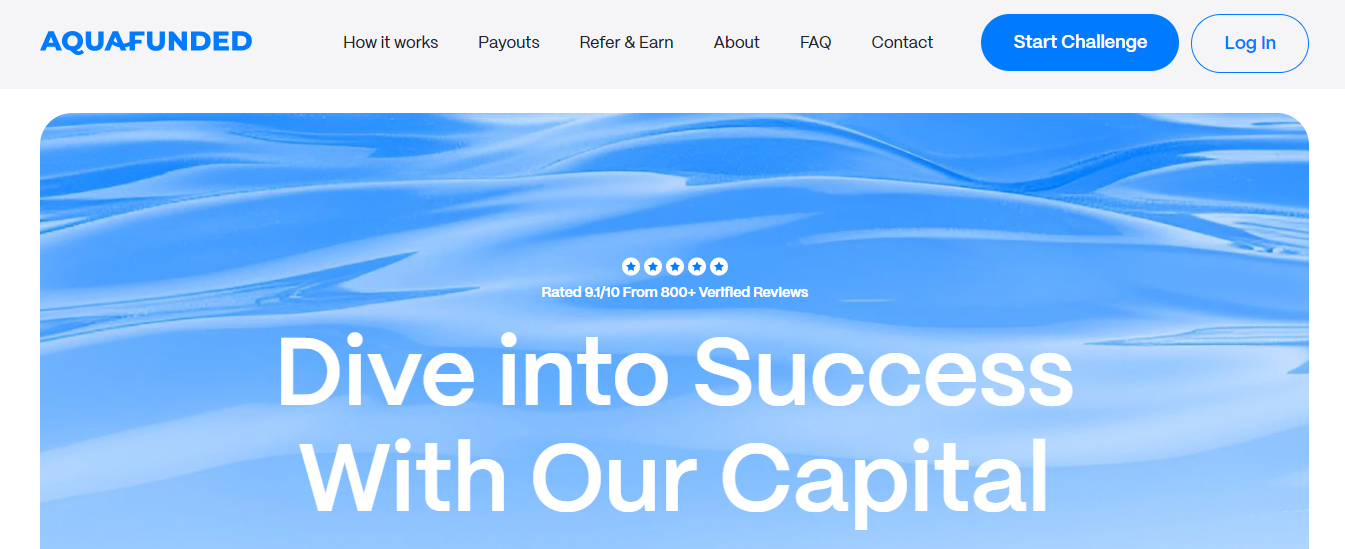
AquaFunded enables you to capitalize on your trading expertise without compromising your finances. Here, you gain access to accounts as large as $400K, with unmatched flexibility and trading conditions. Whether you choose instant funding or a customizable challenge path, Aqua Funded offers a way to earn up to 100% of your profits. With over 42,000 traders already benefiting and a $2.9 million reward payout, it's a platform that's making waves.
2. JP Morgan: Simplified Entry for New Investors

JP Morgan Self-Directed Investing is an accessible platform, perfect for beginners eager to learn the ropes of buying and selling investments. While seasoned investors might find it lacking in terms of assets and tools, its Portfolio Builder feature simplifies the process for newcomers.
Pros
- Commission-free trades on stocks, options, and ETFs.
- User-friendly platform.
- Connectivity with Chase accounts.
- In-person support at Chase branches.
Cons
- Low interest on uninvested cash.
- Limited asset and research offerings.
3. Robinhood: Invest on the Go

Robinhood revolutionized mobile investing with its sleek app and commission-free trades on stocks, ETFs, options, and crypto. It’s user-friendly and supports fractional investing, making it a top choice for beginners with smaller budgets.
Pros
- Free trades on stocks, options, and ETFs.
- Easy-to-navigate interface.
- Cryptocurrency trading is available.
- High interest on uninvested cash.
Cons
- No mutual funds.
- Limited third-party research.
4. ProRealTime: Advanced Tools for the Ambitious

ProRealTime is a versatile trading platform offering a free web and mobile version, plus a premium option for advanced tools. With its strong technical analysis tools, it’s a favorite among over a million users worldwide.
Pros
- Powerful stock charts for free.
- Unlimited practice in a pressure-free environment.
- Reliable order execution.
- Robust technical analysis capabilities.
Cons
- Steeper learning curve.
- Limited newsfeed.
5. Charles Schwab: Practice Makes Perfect

Charles Schwab stands out for its paper trading platform, allowing newcomers to practice trades without risking real money. With a wide range of investments to explore, it’s a beginner-friendly choice with plenty of room for growth.
Pros
- Commission-free stock, options, and ETF trades.
- Five trading platforms with no minimums or fees.
- Access to thinkorswim platforms.
- Extensive research offerings.
Cons
- Low interest on uninvested cash.
6. TradingView: Chart Your Course

TradingView excels with its flexibility, powerful charting tools, and engaged trading community. The free plan is a great starting point for beginners, though most users will quickly find value in upgrading to a paid plan.
Pros
- Cutting-edge charting tools.
- Active trading community for shared strategies.
- Broad compatibility with multiple brokers.
Cons
- Minimal free plan.
- Overwhelming content for new users.
7. SoFi: Guidance at Your Fingertips
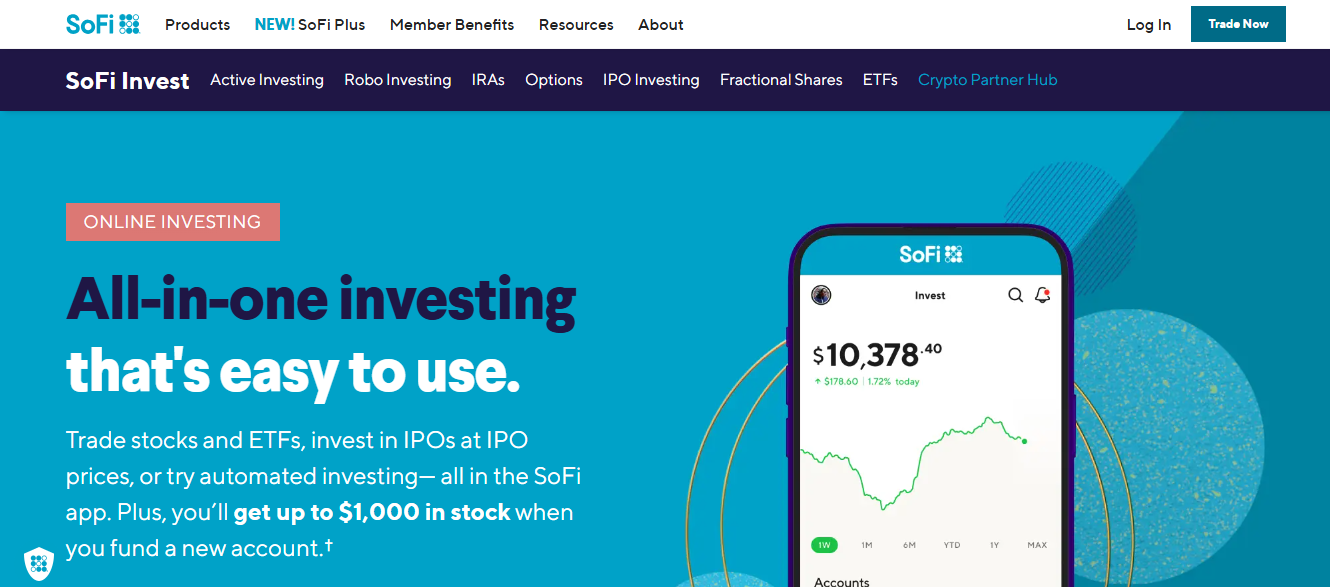
SoFi is unique among brokers for offering investors a meeting with a financial advisor—an invaluable resource for beginners. This feature is free for all members, and SoFi+ members can meet with advisors as often as they like.
Pros
- No commissions on stock, options, and ETF trades.
- IPO access.
Cons
- Low interest on uninvested cash.
8. Trader Workstation: Power for the Experienced
Trader Workstation (TWS) is a robust platform for those who need advanced tools and global market access. With no minimum deposit required, you can explore its features and practice trading without financial risk.
Pros
- Highly customizable trading platform.
- Integration with independent trading platforms.
- Competitive pricing for active traders.
Cons
- Steep learning curve for beginners.
- Tied to Interactive Brokers.
9. Vanguard: A Trusted Name
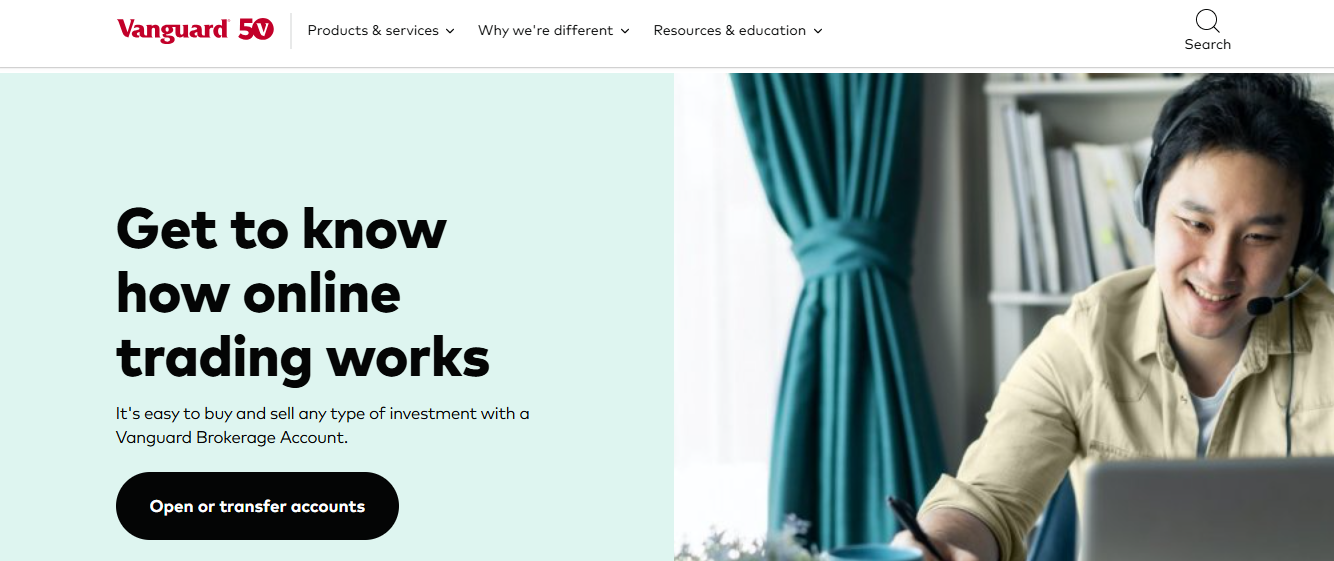
Vanguard is synonymous with hands-off retirement investing. Its low-cost mutual, index, and exchange-traded funds are well-established and highly regarded among analysts.
Pros
- Commission-free trades on stocks, options, and ETFs.
- Leader in low-cost funds.
- High interest on uninvested cash.
- High-order execution quality.
Cons
- Basic trading platform only.
- Limited research and data.
10. Thinkorswim: Learn as You Trade
Thinkorswim provides professional-grade tools with a focus on education. It's particularly valuable for beginners who want to build confidence while using advanced tools, thanks to its in-app tutorials, live webinars, and learning center.
Pros
- Professional-grade charting and technical analysis.
- Built-in learning resources.
- Excellent customer support.
Cons
- Exclusively tied to Charles Schwab accounts for full access.
- Less flexibility compared to platforms supporting multiple brokers.
11. M1 Finance: Investment Made Easy
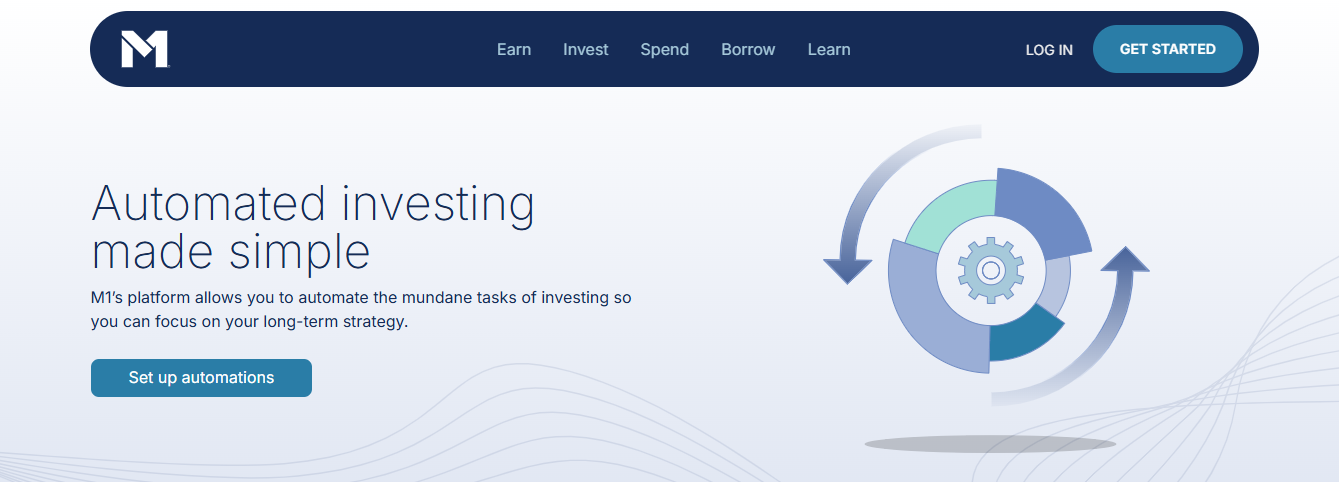
M1 Finance is an excellent choice for beginners, offering a unique approach that helps users truly understand investing. Its highly rated mobile app and Dynamic Rebalancing feature make it easy to maintain target percentages of each investment slice.
Pros
- Commission-free trades for stocks and ETFs.
- Highly rated mobile app.
- Dynamic Rebalancing feature.
- High interest on uninvested cash.
Cons
- Restricted trading windows.
- Limited educational sources.
12. Fidelity: A New Experience for Novices
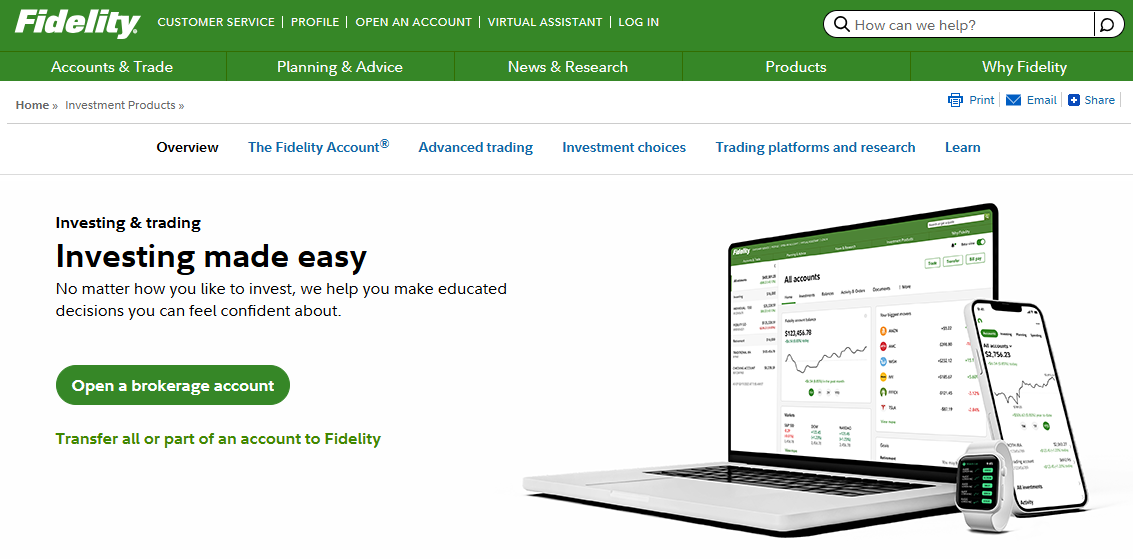
Fidelity has redefined its reputation as a traditional brokerage, offering one of the most beginner-friendly mobile experiences available. Its app combines institutional knowledge with modern features designed to encourage thoughtful decision-making.
Pros
- Institutional-quality research in accessible formats.
- Excellent cash management features.
- Comprehensive customer service options.
Cons
- Slightly steeper learning curve for beginners.
- More text-heavy educational content.
Related Reading
- How To Learn Trading Online
- Is Day Trading Worth It
- Is Day Trading Hard To Learn
- Trading Strategy For Beginners
- Position Trading Strategy
- Profitable Gold Trading Strategy
- Profitable Gold Trading Strategy
- Trading Strategy For Beginners
- Position Trading Strategy
- Option Trading Technical Analysis
How to Choose the Best Trading Platform for Beginners
.jpeg)
Go Anywhere: Choosing the Right Platform Type
When choosing a trading platform, you want flexibility. For most traders, a web-based platform is the ideal choice. It works from anywhere, requires no manual upgrades, and has no maintenance costs. However, if your trading involves complex algorithms that require high computing power, a dedicated computer-based software might be a better option, although it may be pricier. Some brokerages also offer desktop trading software for day traders.
Features to Match Your Trading Style
Your trading strategy dictates the features you need. Are you tracking moving averages or executing a delta-neutral strategy with options and stocks? Do you require specific data, such as forex feeds or binary options? Don’t rely solely on what brokerages claim. Test a trial version to see if it suits your needs. If possible, check out tutorials from the brokerage or vendor to be sure.
Extra Tools for Short-Term Gains
Day trading is all about seizing short-term price movements, often driven by news and market dynamics. Does your strategy require news, charts, Level 2 data, or special market access? Ensure these are included, or confirm if you’ll need to pay extra for them.
Analytical Tools for Smarter Trading
Review the analytical capabilities of a platform. Here are key features you might need:
Technical Indicators and Pattern Recognition
If you trade based on predicting future prices, ensure the platform has robust technical indicators and supports automated trade processing.
Arbitrage Opportunities
Look for platforms that can connect to multiple markets and execute trades quickly to capitalize on price differences.
Mathematical Model-Based Strategies
The software should support strategies like delta-neutral trading, which require evaluating holdings and executing trades for both equities and options.
Trend Following Indicators
For strategies that follow price trends, you need tools that can identify and confirm these trends.
Weighing Costs and Other Considerations
Cost of Software
Find out if the software is included with your brokerage account or if you’ll need to pay for more advanced features.
Price Accuracy
Ensure the platform supports NBBO (National Best Bid and Offer) to guarantee competitive pricing.
Protective Features
Check if the platform has safeguards against "sniffing algorithms" that might detect your trading strategies.
Let’s Talk About AquaFunded
Turn your trading skills into substantial profits without risking your own capital. AquaFunded gives you access to accounts up to $400K with the most flexible trading conditions in the industry – no time limits, easy-to-achieve profit targets, and up to 100% profit split. Join over 42,000 traders worldwide who've already collected more than $2.9 million in rewards, all backed by our 48-hour payment guarantee. Start trading today with instant funding options or prove your skills through our customizable challenge paths and keep up to 100% of what you earn.
Join Our Funded Trading Program Today - Trade with our Capital and Keep up to 100% of the Profit.
Imagine trading with $400,000 without risking a dime of your own money. That's AquaFunded. They offer the most flexible trading conditions out there. Think no time limits, easy profit targets, and an impressive profit split of up to 100%. Over 42,000 traders worldwide have already secured more than $2.9 million in rewards. And with a 48-hour payment guarantee, you get your earnings fast. Whether you prefer instant funding options or want to prove your skills through customizable challenge paths, AquaFunded has you covered.
Related Reading
- Algorithmic Trading Risk Management
- Best Forex Trading App For Beginners
- What Is Risk Management In Trading
- Day Trading Risk Management
- Forex Risk Management Tools
- Trading Risk Management Tools
- Best Day Trading Platform For Beginners
- Best Indicators For Swing Trading
- Best Platform For Day Trading Crypto



